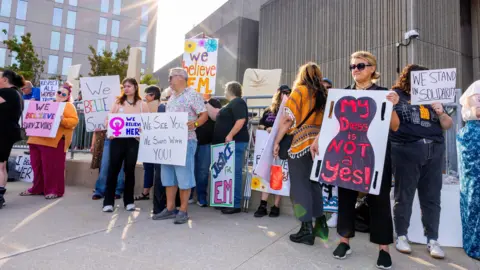Five ice hockey players found not guilty in Canada sexual assault case
12 minutes agoNadine YousifBBC News, London, Ontario

 Reuters
ReutersFive Canadian ice hockey players accused of sexually assaulting a woman were all acquitted by an Ontario judge on Thursday.
In a packed courtroom, Justice Maria Carroccia reviewed testimony and evidence from the highly publicised eight-week trial over the course of several hours, before declaring the men not guilty.
The former players for Canada’s world junior hockey team were accused of assaulting the woman, known as EM, in a hotel room in 2018 in London, Ontario, where they had attended a Hockey Canada gala.
Justice Carroccia said she did not find EM’s evidence “credible or reliable”. She added that “the Crown cannot meet its onus on any of the counts before me”.
The central issue of the trial was whether EM, who was 20 at the time, had consented to every sexual act in the room that night.
Lawyers for the players contended that she asked the men to have sex with her and they believed she gave consent.
Michael McLeod, Dillon Dube, Cal Foote, Alex Formenton and Carter Hart were all players with the National Hockey League (NHL) when the allegations surfaced, although one was playing in Europe. Only one, Mr Hart, testified in his own defence.
The trial attracted significant attention in Canada, and so many people attended court to hear the ruling on Thursday that clerks had to open two additional overflow rooms.
In explaining her ruling, Justice Carroccia pointed to inconsistencies in EM’s testimony, including about who had bought drinks that night, and said EM’s statements reflected an “uncertain memory” that did not line up with evidence presented in the trial.
There were differences in what the woman told police investigators and those for Hockey Canada, which settled a C$3.5m ($2.5m; £1.9m) lawsuit for an undisclosed sum in 2022, as well, the judge said.
Two videos from the incident were shared in the trial, where EM was recorded giving her consent to the activities. The first was taken without her knowledge.
While, under Canadian law, the videos did not establish consent, the judge said they did show EM “speaking normally, smiling,” and that she “did not appear to be in distress.” That undercut the Crown’s argument that EM did not leave the room out of fear, she said.
It is unclear if the Crown will appeal the ruling, with prosecutor Meaghan Cunningham saying in a statement that they will carefully review the decision. She also said they had received “dozens of messages from people across Canada and abroad” expressing thanks and support for EM.
“A successful prosecution is not measured solely by whether there are guilty verdicts at the end,” she said. “The Crown’s goal throughout this proceeding has been to see a fair trial, a trial that is fair to the men charged, and one that is also fair to EM.”
Throughout the trial, the Crown argued the woman’s testimony was credible, that “intoxication does not equal unreliability” and that any inconsistencies in her testimony were minor.
They also argued the woman did not have a motive to fabricate a story and that she had initially reported the alleged assault to police in 2018, four years before filing the lawsuit against Hockey Canada.
They added that text messages between the players allegedly showed it was Mr McLeod’s idea to invite his teammates to the room and that the players allegedly engaged in “getting their story straight” by drafting a narrative that EM had consented to all sexual activity.

 Reuters
ReutersDefence lawyers, however, argued that EM’s testimony was undermined by eyewitness evidence , in which other players who were in the hotel room that night but were not charged said she was “vocal” about what she wanted sexually.
They said the evidence suggested the woman was a willing participant who later experienced regret, and added that intoxication in this case did not equal “incapacity”, submitting video evidence suggesting EM had not shown signs of extreme intoxication.